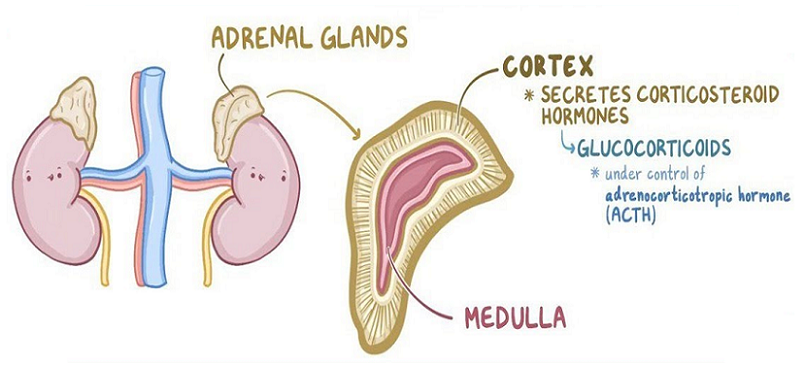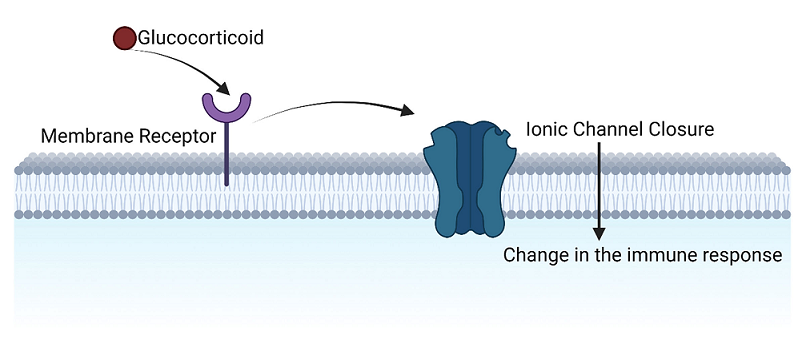
In the intricate dance of hormones within our body, glucocorticoids play a pivotal role, especially in how we respond to stress and how our brain functions. These powerful hormones, with cortisol leading the charge, are essential for our survival, influencing everything from our mood to our memory. Yet, their impact is a double-edged sword. While essential in moderate amounts for managing stress and ensuring our cognitive mechanisms operate smoothly, an imbalance can lead to a host of issues, from mental health disorders to cognitive impairments. Understanding the role of glucocorticoids in stress response and brain function is crucial for anyone interested in the nexus of hormonal balance and cognitive health.
Contents
- Introduction to Glucocorticoids
- The Nature of Glucocorticoids
- Glucocorticoids and Stress Response
- Glucocorticoids and Brain Function
- References
Introduction to Glucocorticoids
In the realm of neuroscience and endocrinology, the study of hormones and their impact on both physical and mental health is a field of unending fascination and critical importance. Among the myriad of hormones coursing through our bodies, glucocorticoids stand out for their profound effects on how we handle stress and the intricate workings of our brains. These steroid hormones, with cortisol being the most notable among them in humans, are pivotal in a wide array of physiological processes, including the regulation of metabolism, the immune response, and, crucially, the stress response.
Definition of Glucocorticoids
Glucocorticoids are a class of corticosteroids, which are a type of steroid hormone produced in the adrenal cortex of the kidneys. They are named for their role in glucose metabolism and their origins in the cortex of the adrenal glands. These hormones are essential in modulating the body’s response to stress, affecting how energy is produced and used, and playing a significant role in the immune system’s inflammatory response.
Overview of Hormones and Brain Function
The brain is an incredibly hormone-sensitive organ, intricately linked to the endocrine system through various pathways. Hormones like glucocorticoids influence brain function in numerous ways, from the development of neurons to the regulation of mood and memory. Understanding the interaction between hormones and the brain is crucial for deciphering the complex mechanisms underlying human behavior, mood disorders, and cognitive functions.
Importance of Understanding Glucocorticoids in the Context of Stress and Cognitive Health
In today’s fast-paced world, the effects of stress on mental and physical health cannot be overstated. Glucocorticoids play a central role in the body’s stress response, acting as both saviors and potential saboteurs, depending on their levels and the duration of their presence in the bloodstream. Excessive or prolonged exposure to glucocorticoids, particularly cortisol, can lead to detrimental effects on brain function, including impaired memory and increased risk of psychiatric disorders. Conversely, a well-regulated glucocorticoid system supports resilience to stress and optimal cognitive function [1].

The Nature of Glucocorticoids
Glucocorticoids are a cornerstone of the body’s response system to stress and play a significant role in maintaining homeostasis. They are synthesized in the adrenal cortex and are instrumental in influencing various physiological processes. Understanding their chemical nature, production, and types provides a foundation for comprehending their broader implications on health and disease.
Chemical Structure and Production of Glucocorticoids
At the core of glucocorticoids’ functionality is their chemical structure, which enables them to interact with specific receptors throughout the body, influencing a wide range of physiological responses.
Origins in the Adrenal Cortex
Glucocorticoids are synthesized in the zona fasciculata, the middle layer of the adrenal cortex. Their production is a complex process, initiated by the release of corticotropin-releasing hormone (CRH) from the hypothalamus, which then stimulates the anterior pituitary gland to secrete adrenocorticotropic hormone (ACTH). ACTH, in turn, acts on the adrenal cortex to stimulate the synthesis and release of glucocorticoids.
Key Components and Synthesis Process
The synthesis of glucocorticoids involves the conversion of cholesterol into pregnenolone, which serves as a precursor for the production of all steroid hormones, including cortisol. This process is tightly regulated by enzymes that ensure the appropriate conversion steps occur efficiently and in response to the body’s needs [2].
Types of Glucocorticoids
Understanding the various types of glucocorticoids, including both natural and synthetic, reveals the scope of their applications in both physiological and therapeutic contexts.
Cortisol: The Primary Glucocorticoid in Humans
Cortisol is the principal glucocorticoid produced in humans. It plays a critical role in the stress response, regulating metabolism, reducing inflammation, and controlling the sleep-wake cycle, among other functions. Its levels fluctuate throughout the day, peaking in the early morning and reaching their lowest point late in the evening.
Synthetic Glucocorticoids: Uses and Examples
Synthetic glucocorticoids, such as prednisone and dexamethasone, are designed to mimic the effects of natural cortisol but with enhanced potency or specific therapeutic applications. They are widely used in medicine to treat conditions involving inflammation and autoimmune diseases due to their potent anti-inflammatory and immunosuppressive properties.
Regulation of Glucocorticoid Production
The body maintains a delicate balance in glucocorticoid levels through a feedback mechanism involving the hypothalamus, pituitary gland, and adrenal cortex, known as the HPA axis.
The Hypothalamic-Pituitary-Adrenal (HPA) Axis
The HPA axis plays a crucial role in the regulation of glucocorticoid production. It operates through a feedback loop where increased levels of glucocorticoids signal the hypothalamus and pituitary gland to reduce the release of CRH and ACTH, thereby decreasing glucocorticoid production. This system ensures that hormone levels remain within a healthy range, adapting to the body’s changing needs [3].
Feedback Mechanisms and Circadian Rhythms
Glucocorticoid secretion is also influenced by circadian rhythms, which explain the natural fluctuations in hormone levels throughout the day. This circadian regulation ensures that glucocorticoid levels are synchronized with the body’s daily cycles, optimizing energy use and physiological processes according to the time of day.

Glucocorticoids and Stress Response
The relationship between glucocorticoids and stress response is a fascinating aspect of human physiology, showcasing how our bodies adapt to challenges and maintain equilibrium. Glucocorticoids serve as the body’s primary mechanism for managing stress, whether it stems from psychological, physical, or environmental sources.
Mobilization of Glucocorticoids During Stress
When faced with a stressor, the body’s immediate reaction is to ensure survival through the activation of the stress response system, prominently involving the release of glucocorticoids.
The Role of the HPA Axis in Stress Response
The hypothalamic-pituitary-adrenal (HPA) axis is central to the body’s stress response. Upon perceiving stress, the hypothalamus secretes corticotropin-releasing hormone (CRH), which stimulates the pituitary gland to release adrenocorticotropic hormone (ACTH). ACTH then prompts the adrenal glands to produce and release glucocorticoids, primarily cortisol, into the bloodstream. This cascade effect is a prime example of the body’s rapid response system to stress, showcasing the pivotal role of glucocorticoids.
Immediate Effects on the Body
The immediate release of glucocorticoids has several effects on the body designed to handle acute stress. These include mobilizing energy by increasing glucose levels in the bloodstream, enhancing the brain’s use of glucose, and suppressing non-essential functions like digestion, reproduction, and growth processes. This physiological state prepares the individual to react to the stressor through the “fight or flight” response [4].
Effects of Glucocorticoids on the Body During Stress
The effects of glucocorticoids on the body during stress are wide-ranging, impacting various systems to optimize the body’s response to immediate threats.
Metabolic Changes
One of the primary roles of glucocorticoids during stress is to ensure that the body has enough energy to face the stressor. They do this by increasing blood sugar levels, enhancing the brain’s glucose utilization, and breaking down fats and proteins. These metabolic changes are crucial for providing the energy required for a rapid response to stress.
Suppression of Immune System Functions
Glucocorticoids also temporarily suppress the immune system’s functions to prioritize the body’s immediate response to stress. This suppression reduces inflammation and inhibits the release of pro-inflammatory cytokines, which, while beneficial in the short term, can lead to vulnerabilities if the stress response is prolonged.
Chronic Stress and Glucocorticoid Regulation
The effects of chronic stress on glucocorticoid regulation are a testament to the complexity of the stress response system and its potential implications for health.
Impacts of Prolonged Stress Exposure
Chronic exposure to stress can lead to dysregulation of the HPA axis, resulting in consistently elevated levels of glucocorticoids. This dysregulation can have numerous health consequences, including increased risk for depression, anxiety disorders, cardiovascular disease, and metabolic syndrome. The body’s stress response system, designed for short-term threats, can become maladaptive when activated over prolonged periods.
Adaptation and Feedback Mechanisms
In response to chronic stress, the body may attempt to adapt through changes in glucocorticoid receptor sensitivity and alterations in the feedback mechanisms that regulate the HPA axis. These adaptations can lead to a state of glucocorticoid resistance, where higher levels of hormones are required to achieve the same physiological effects, further complicating the body’s stress response and impacting overall health.
Glucocorticoids and Brain Function
The impact of glucocorticoids extends beyond stress response, profoundly influencing brain function and health. These hormones play crucial roles in modulating cognitive processes, emotional regulation, and overall brain health.
Cognitive Effects of Glucocorticoids
Glucocorticoids have a significant influence on cognitive functions, including memory, attention, and learning. Their effect on the brain is complex, facilitating certain cognitive processes while impairing others.
Enhancement of Cognitive Functions
In the short term, moderate levels of glucocorticoids can enhance cognitive performance. They improve attention, motivation, and vigilance, which are crucial for facing immediate challenges or stressors. This enhancement is thought to be mediated by glucocorticoids’ action on the prefrontal cortex, a key area involved in executive functions and decision-making [5].
Impairment of Memory and Learning
Conversely, prolonged exposure to high levels of glucocorticoids can impair cognitive functions, particularly memory and learning. Chronic stress, resulting in elevated glucocorticoid levels, has been linked to hippocampal atrophy, which can affect the consolidation of long-term memories and spatial navigation. This impairment underscores the importance of glucocorticoid regulation for maintaining cognitive health.
Emotional and Psychological Well-being
Glucocorticoids also play a pivotal role in emotional regulation and psychological well-being. Their effect on mood and emotional responses can be as profound as their impact on cognitive functions.
Regulation of Mood and Emotional Responses
Glucocorticoids are involved in modulating mood and emotional responses, with their action on the amygdala being particularly crucial. This brain region is central to processing emotions, and glucocorticoids can influence how emotional stimuli are perceived and responded to, potentially affecting stress resilience and vulnerability to mood disorders.
Link to Anxiety and Depression
Chronic elevation of glucocorticoid levels has been associated with an increased risk of developing anxiety and depression. The persistent activation of the HPA axis and subsequent glucocorticoid release can lead to changes in brain regions critical for mood regulation, such as the hippocampus, prefrontal cortex, and amygdala, contributing to the pathophysiology of these mental health conditions.
Neurological Health and Neurogenesis
The relationship between glucocorticoids and neurological health is a key area of research, with implications for understanding and treating neurodegenerative diseases and conditions affecting brain health.
Impact on Neurogenesis
Glucocorticoids have a profound effect on neurogenesis, the process by which new neurons are formed in the brain. While acute stress and transient glucocorticoid elevations can stimulate some aspects of neurogenesis, chronic stress and prolonged glucocorticoid exposure can significantly impair this process, particularly in the hippocampus. This impairment can contribute to cognitive decline and reduced brain plasticity.
Glucocorticoids and Neurodegenerative Diseases
Research suggests a link between dysregulated glucocorticoid levels and the progression of neurodegenerative diseases such as Alzheimer’s and Parkinson’s disease. Elevated glucocorticoid levels can exacerbate neuroinflammation, neuronal loss, and accumulation of pathological proteins, potentially accelerating the progression of these diseases.
References
[1] Stress and glucocorticoid receptor-dependent mechanisms in long-term memory
[2] The Role of the Glucocorticoids in Developing Resilience to Stress and Addiction
[3] Glucocorticoids: restoring balance during stress
[4] Glucocorticoids, epigenetic control and stress resilience
[5] How Do Glucocorticoids Influence Stress Responses?

